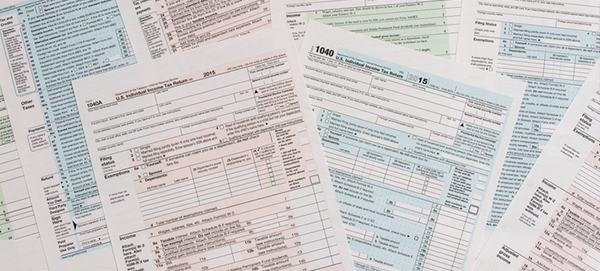For American Expats: A U.S. Tax Form Checklist
By Peggy Creveling, CFA, and Chad Creveling, CFA
This article is for general information purposes only and is not intended as specific tax advice. Please consult your tax advisor for advice relevant to your situation.
It’s that time of year when many Americans living overseas are collecting the various documents needed to file their 2020 U.S. taxes.
Below we’ve provided an updated checklist to help you with filing; this list should be used as a starting point only. Please note that U.S. citizens and green card holders cannot "opt out" of filing or paying U.S. federal income tax even if they're legally residents in another country. More detail on expat filing requirements as well as the details of each form can be found on the IRS website: www.irs.gov.
- Updates to Form 1040 and Its Various Schedules. See the 2020 1040 Instructions for updates and changes from previous years. Some changes to note: the addition of a new line 30 for claiming “recovery rebate credit” for eligible stimulus payments that were not received. Additionally, the question “At any time during 2020, did you receive, sell, send, exchange, or otherwise acquire any financial interest in any virtual currency?” has been moved to Page 1 of the 1040, just below the name and address section. (A sale or exchange of cryptocurrency is a taxable event reportable on Form 8949 and Schedule D. Cryptocurrency holdings may also be reportable on Form 8938.)
- FinCEN 114—Report of Foreign Bank and Financial Accounts (FBAR). If you own or have authority over one or more foreign financial accounts, including bank accounts, brokerage accounts, mutual funds, unit trusts, or other types of financial accounts, and the aggregate value of all your foreign financial accounts was over USD 10,000 at any time during the year, you're required to report all foreign financial accounts (even if some have zero or negative balance) each year to the U.S. Department of the Treasury. This form must be filed online through the BSA E-Filing System website.
- Schedule B—Interest and Ordinary Dividends. Importantly for expats: Besides reporting interest and dividends, you must file Schedule B if you have a foreign bank or financial account or signatory authority over one, or if you received distributions from or were guarantor of a foreign trust. If any of those apply, file the schedule and be sure to check the “Yes” box in Part III 7a—according to the schedule instructions, this is required even if you aren't required to file the FBAR or FinCEN Form 114 outlined above.
- Form 2555—Foreign Earned Income and Housing Exclusion. If you qualify, use this form to exclude foreign earned (salary) income of up to USD 107,600 for 2020, as well as potentially exclude or deduct housing costs. The standard maximum housing expense limitation for 2020 is USD 32,280. After deducting the base housing cost of USD 17,216, the maximum standard housing exclusion for 2020 is USD 15,064. However, greater deductions may be allowed in 2020 if you live in a high-cost city. For example, the maximum housing expense limitations are higher for cities like Bangkok (USD 59,000), Hong Kong (USD 114,300), Singapore (USD 82,900), Beijing (USD 69,000), London (USD 71,500), Kuala Lumpur (USD 46,200) and Ho Chi Minh (USD 42,000).
- Form 1116—Foreign Tax Credit (FTC). If you've paid foreign taxes on foreign income (from either your salary or investments) and you haven't otherwise excluded the income from your U.S. taxes, you may be able to take a credit against any U.S. taxes owed by filing this form.
- Should You Take the Foreign Earned Income Exclusion (FEIE), or Use the Foreign Tax Credit (FTC)? If you’re a high-income earner in a high local tax jurisdiction such as Thailand, you may be able to save more in U.S. taxes if you use the FTC only, rather than by using a combination of the FEIE and FTC. This is even more the case following the recent tax cut—even though the FEIE has gone up in USD terms, it is now worth less in U.S. tax dollars savings since lower U.S. marginal brackets now apply. It can pay to calculate your U.S. tax burden under both FEIE and FTC to see if FTC may be a better deal. Just remember that once you revoke the FEIE, you can’t use it again for another five years without IRS approval.
- Form 8938—Statement of Foreign Financial Assets. U.S. expats need to file Form 8938 for tax year 2020 if your filing status is Single, Head of Household, or Married Filing Separately and you had more than USD 200,000 in aggregate specified foreign assets on the last day of the year or USD 300,000 at any time during the year. U.S. expats who file Married Filing Jointly need to file Form 8938 if you have aggregate specified foreign assets of USD 400,000 on the last day of the year or USD 600,000 at any time during the year. Some examples of specified foreign assets include:
- Savings, deposit, checking, and brokerage accounts held with a bank or broker-dealer
- Any interest in a foreign-issued insurance contract or annuity with a cash-surrender value
- Stock or securities issued by a foreign corporation
- A note, bond, or debenture issued by a foreign person
- A partnership interest in a foreign partnership
- An interest in a foreign retirement plan or deferred compensation plan
- Real estate that is owned through a foreign entity, such as a corporation, partnership, trust, or estate
- An option or other derivative instrument with respect to any of these examples or with respect to any currency or commodity that is entered into with a foreign counterparty or issuer
- An interest in a foreign estate
Cryptocurrency? As of the time of writing, the IRS has not specified whether cryptocurrency holdings or wallets on foreign exchanges must be reported on Form 8938. Until it’s clarified, tax professionals may advise disclosing such holdings on Form 8938 to avoid future problems.
For more information, see Basic Questions and Answers on Form 8938.
- Form 8621—Information Return for Passive Foreign Investment Company (PFIC). Passive foreign investment companies (PFICs) can include foreign-domiciled mutual funds, offshore investment schemes, foreign money market funds, or resident country tax-deferred funds such as Thai RMFs, SSFs, or LTFs. If you own shares in a PFIC (either directly or indirectly), you're generally required to file Form 8621 for each PFIC that you own on an annual basis if the aggregate value of all PFICs is greater than USD 25,000 at year's end, or USD 50,000 for joint filers.
In some cases, your PFIC may provide shareholders with a "PFIC Annual Information Statement." This statement allows you to elect qualified electing fund (QEF) treatment on Form 8621, resulting in U.S. taxation similar to a U.S.-domiciled mutual fund. If your PFIC does not provide this statement, your options are to either elect "mark-to-market" treatment or otherwise default to the more onerous "excess distribution" rules, which results in the highest amount of U.S. tax owed. PFIC rules and tax calculations are complex—seeking help from a professional tax preparer well-versed in the form is advisable.
- Form 5471—Information Return of U.S. Person with Respect to Certain Foreign Corporations. If you're a shareholder of a controlled foreign corporation (CFC), you must file this form and all related schedules. A foreign company is generally classified as a CFC if you own 10% of the shares or control 10% of the voting rights. American expats who own foreign registered businesses or significant stakes in restaurants, bars, or other companies may need to file this form. Note that from 2018, Form 5471 has been amended to include a number of changes caused by the Tax Cuts and Jobs Act. Everything about Form 5471 is even more complicated, including the tests for whether you must file the form, as well as the form and its numerous required schedules and footnotes. Penalties for non-filing are high. If you think you may need to file Form 5471, and to make sure that it is completed correctly, it may make sense to seek professional advice.
- Form 8992—U.S. Shareholder Calculation of Global Intangible Low-Taxed Income (GILTI). Beyond 2017’s Section 965 “Transition Tax” outlined below, the Tax Cuts and Jobs Act requires U.S. taxpayers who are 10% or greater shareholders of CFCs to pay current year tax on certain types of income from their CFC, regardless of whether the income is distributed or repatriated. The GILTI tax is calculated using Form 8992. Like Form 5471 and Section 965 Transition tax, Form 8992 is complicated. Shareholders of CFCs may wish to consult a qualified tax advisor.
- Section 965—One-Time Transition Tax for Shareholders of Foreign Corporations. The Tax Cuts and Jobs Act included a one-time “transition tax” for U.S. taxpayers who own 10% or more in a foreign company on the undistributed retained earnings of the company as of December 31, 2017. The tax, or at least an installment of it, was due to be paid in 2018, and additional documentation and statements related to the transition tax was to be included in the 2017 1040 filing. If you missed this, you may wish to consult a qualified tax advisor to revise your 2017 (and 2018) taxes.
- Form 926—Return of a U.S. Transferor of Property to a Foreign Corporation. Generally, you are required to file this form in the year you transfer cash, assets, or property (tangible or intangible) to a foreign corporation. U.S. citizens either just setting up and providing initial capital to a foreign business or injecting fresh capital/new assets to an existing business may need to file this form.
- Form 8865—Information Return of U.S. Persons with Respect to Certain Foreign Partnerships. If you're a partner in a foreign partnership with five or fewer U.S. partners who each own 10% or more interest and in aggregate have more than 50% of the partnership, you may need to file this form to report income and transactions between you and the partnership.
- Form 3520—Annual Return to Report Transactions with Foreign Trusts and Receipt of Certain Foreign Gifts. This form is used to report transactions you may have with foreign trusts, as well as if you receive large gifts from foreign persons (greater than USD 100,000), or corporations or partnerships (greater than USD 16,649 for 2020).
- Form 3520-A—Information Return of Foreign Trust with a U.S. Owner. If you own a foreign trust, you need to file this form to provide information about the trust, its U.S. beneficiaries, and anyone who's treated as an owner of any portion of the trust. While the Form 3520 is due with the taxpayer’s extended tax return, filing Form 3520-A is not automatically extended. Instead, file Form 7004 to request a filing extension for Form 3520-A.
The above list is not intended to be comprehensive, and other forms may be needed depending on your particular situation. Failure to file required forms can result in substantial penalties, even if the omission was not intentional. Please consult your tax advisor for advice relevant to your situation.
This article is a revised and updated version of ones that have appeared previously on www.crevelingandcreveling.com.
About Creveling & Creveling Private Wealth Advisory
Creveling & Creveling is a private wealth advisory firm specializing in helping expatriates living in Thailand and throughout Southeast Asia build and preserve their wealth. The firm is a Registered Investment Adviser with the U.S. SEC and is licensed and regulated by the Thai SEC. Through a unique, integrated consulting approach, Creveling & Creveling is dedicated to helping clients cut through the financial intricacies of expat life, make better decisions with their money, and take the steps necessary to provide a more secure future.
Copyright © 2021 Creveling & Creveling Private Wealth Advisory, All rights reserved. The articles and writings are not recommendations or solicitations, and guest articles express the opinion of the author; which may or may not reflect the views of Creveling & Creveling.


